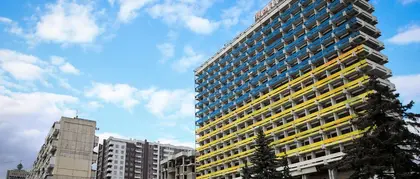The streets of Chisinau, the capital of Moldova, are sunny and peaceful. People look relaxed and appear to be enjoying their lives. Though subtle, the contrast with the streets of Ukrainian towns and cities, even those far from the frontlines, is obvious.
Yet the Russian-Ukrainian war, the largest in Europe since World War II, casts its long shadow over neighboring Moldova. Russian missile strikes on Ukrainian territory close to the Moldovan border were heard by people across the country on Feb. 24, when Russia launched its full-scale invasion of Ukraine.
JOIN US ON TELEGRAM
Follow our coverage of the war on the @Kyivpost_official.
Moldova had once already become a victim of Russian hybrid aggression in the early 1990s, which resulted in the creation of an unrecognized rump statelet of Transnistria. Were Ukraine to fall, chances are high that Moldova would be next on the list of Russian targets.
The on-going war has exacerbated the tough situation faced by pro-European Union authorities of the country. President Maia Sandu, a prominent reformist politician, took power at the end of 2020 from the hands of pro-Russian Igor Dodon. Then, in 2021 her Party of Action and Solidarity (PAS) won a landslide victory in the parliamentary elections, obtaining a 63-seat majority in the parliament of 101 seats.
PAS formed a new government headed by Prime Minister Natalia Gavrilița. And immediately, the new government became the target of Russia’s energy blackmail. Gazprom refused to roll-over (as it had traditionally done in the past) the existing 30-year gas contract with Moldova. Instead, it offered a three-fold price increase to the country, provoking a gas crisis that has been ongoing ever since. The war has only deepened that crisis – disrupting the economy of the whole region and forcing thousands of Ukrainian refugees to flee to Moldova.

EU Transfers €1.5 Bln Raised From Russian Assets for Ukraine
Despite being one of the poorest countries in Europe, Moldova has been able to grow steadily for many years, with annual GDP growth averaging 4.4% since 2000. Moldova’s growth model is peculiar, since it is largely based on consumption funded by remittances of migrant workers (in accounting terms, Moldova’s consumption is actually higher than its entire GDP). According to some estimates, such migrant workers constitute about 25 percent of the country’s entire labor force. Their remittances have been crucial in keeping the country afloat and driving its economic growth.
Moldova experienced a banking crisis in 2014, driven by massive bank fraud – the size of the embezzled assets amounted to 12 percent of the country’s GDP. Nevertheless, Moldova managed to clean up its banking sector and to preserve macroeconomic stability, whilst also keeping its public debt at a low level (close to 30 percent of GDP).
Its currency, the leu, has been relatively stable in recent years. After the coming to power of Sandu’s PAS, the country is also free from the influence of oligarchs within the ruling authorities – a rare achievement among the post-Soviet nations.
Yet the challenges are daunting. Inflation in Moldova is currently the highest in Europe, standing at 33 percent – a major hit on the already poor population. The Russian gas blackmail continues and, given Russia’s track record of weaponizing its energy exports to put political pressure on other countries, will likely continue in future.
As with all states with a large Russian-speaking population, another favorite Russian instrument – its reality-distorting propaganda – is also deployed against the country, trying to shake faith in the pro-EU authorities and restore the corrupt pro-Russian politicians to power. And while Ukraine is holding the line militarily and protecting Moldova from a possible direct Russian attack, the threat of war is never too far away.
Moreover, Moldova plays a major role in logistics supply to Ukraine – a vital bloodline that is keeping the Ukrainian economy afloat, especially as its usual Black Sea port arteries have only now started to re-open from the Russian maritime blockade. In the meantime, the Moldovan port of Giurgiulești has become an important logistical hub for imports to Ukraine and for exports of Ukrainian goods abroad.
Thus, while the main battleground of the Russian war on the democratic world is on the frontlines in Ukraine, the neighboring countries, Moldova included, are also part of that war. As Ukraine, Moldova is another example of a country on a successful, if hard and slow, pro-Western transition and development path among the post-Soviet nations. It is important for the free world to help it keep to that path.
Pavlo Kukhta is a Ukrainian economist and politician. He was the acting minister of economy of Ukraine in 2020 and senior advisor at the ‘Support to the EU High-Level Advisors Mission to Moldova’ project
The views expressed in this article are the author’s and not necessarily those of the Kyiv Post.
You can also highlight the text and press Ctrl + Enter






